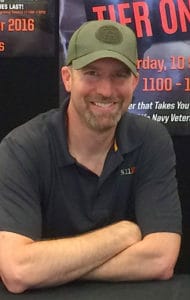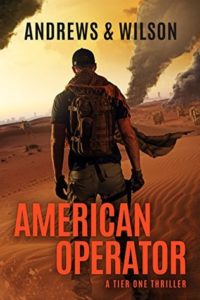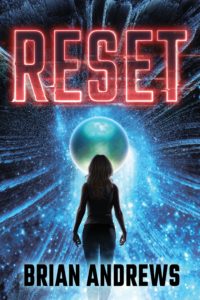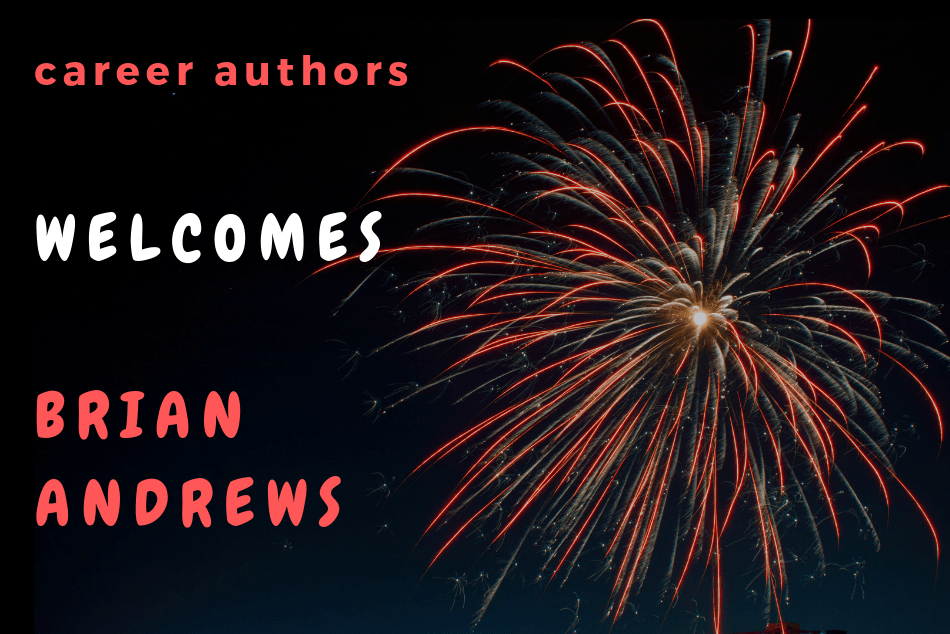Here at Career Authors, we’re thrilled to announce that Brian Andrews is joining us. Brian is a US Navy veteran, nuclear engineer, and former submarine officer. And if that weren’t enough, he’s a really good writer whose work runs the gamut from soldiers and spies to SFF. He co-authors the Wall Street Journal and Amazon #1 best-selling military & covert operations TIER ONE thriller series with fellow veteran Jeffrey Wilson—and writes stand-alone science fiction and blended genre techno-fantasy novels.
 We sat down with Brian and took turns asking him questions about writing and the writing life. Here’s what he had to say.
We sat down with Brian and took turns asking him questions about writing and the writing life. Here’s what he had to say.
HANK ASKS BRIAN
What authors do you admire? Were there special writers who inspired you to begin writing fiction? What books do you look at as iconic?
I’ve met and dialogued with many fantastic authors over the years. Some authors I admire for their craft, some for their tenacity, others for their creativity, and still others for their generosity and support. To properly answer your question the list would read like the after credits of an Avengers movie.
Nonetheless, I would like to specifically highlight the International Thriller Writers (ITW) as an organization of authors that does a particularly great job of inspiring, teaching, and helping support other authors. ITW member author Grant Blackwood gave my debut novel an endorsement when everyone else was too busy. Jon Land tirelessly and selflessly introduced me to authors and publishers when I didn’t know a soul. Amy Rogers supported me with interviews, reviews, and articles to help promote my work. I admire each for their storytelling talents, but I’m equally grateful for their authorial altruism. Now that I’m established, I try to pay it forward with similar efforts for aspiring authors.
Of all the writers I’ve met, Jeffrey Wilson has had the biggest impact on my development as a career author. As of today, we’ve collaborated and co-authored eight novels (most notably the TIER ONE series) and have a half dozen more projects in various stages of development. His creativity, enthusiasm, humor, and storytelling acumen impress and motivate me daily.
Writing need not be, nor should it be, a solitary endeavor. They say it takes a village to raise a child; well, the same could be said for publishing a book. None of my novels were written in a vacuum, and ultimately the more input and help I received during the process, the better the finished product…just something for aspiring novelists to keep in mind.
Regarding iconic works that inspired me before I became an author, three books from three different authors formed the “Holy Trinity” of inspiration. They are: The Hunt for Red October by Tom Clancy, The Bourne Identity by Robert Ludlum, and The Eye of the Needle, by Ken Follett. Even today, these novels are still widely lauded and relevant in the genre of covert operations and military action thrillers.
 What’s the best advice anyone gave you? And the words? About writing, I mean. But hey, about life, too. Now that you’re in the writing life, what advice would you give someone thinking about beginning his career?
What’s the best advice anyone gave you? And the words? About writing, I mean. But hey, about life, too. Now that you’re in the writing life, what advice would you give someone thinking about beginning his career?
The best writing advice I’ve been given is “All writing is rewriting.” This little adage was paradigmatic for me and changed my entire writing ethos. When I was an aspiring author, my natural inclination was to politely close myself off from criticism. I would stubbornly defend and preserve my prose, dialogue, and plot regardless of the feedback. Moreover, I had the mentality that my first draft had to be perfect, which drove me to contemplate every scene, every sentence, heck, every verb ad nauseam. This flawed mindset is why it took me 8 years to write my first novel!
These days, I can write a novel in four to five months. So, what happened? I realized that the process of writing and the process of revising are one and the same. It was a giant weight off my back to realize that anything I write is fair game for revision or deletion. A first draft is an exploration—a safe place to try out ideas, get to know my characters, and explore the uncharted territory in the world I’m creating.
It’s during the revision process that the story solidifies. As the draft gets torn apart and reworked, I find opportunities to add conflict, bolster tension and stakes, and weave nuance and subtext into the story. That’s when the story gets good! I no longer strive to write the perfect novel because there’s no such thing as a “perfect” novel.
The expression “perfect is the enemy of good” applies doubly so to novelists. In closing, my advice to aspiring authors is simply this: Stop trying to write the perfect novel, resist the temptation to treat your manuscript like a walled garden, and pen the best novel you can in a reasonable timeline—and then set it free.
DANA ASKS BRIAN
It’s fascinating that you write novels in various genres. How different are the writing experiences and rewards of writing science fiction versus military fiction? What do you get out of one that you don’t get from the other? And are there still other writing genres you would like to explore?
Writing military fiction is incredibly rewarding but it requires a high level of authenticity because the novels are set in the real world. Readers in the genre are typically tech savvy, understand geopolitics, and a large percentage of them are either active duty military or veterans. They are quick to recognize and point out mistakes in tactics, jargon, and tradecraft. They are familiar with the specifications and operation of military hardware, weapon systems, and platforms. If you try to force your readers to suspend their disbelief because of your own ignorance, they will abandon you. In military fiction, “street cred” is everything—hard to earn and easy to lose. So, in answer to your question, writing military fiction comes the most natural to me, but it is also the most anxiety-inducing on pub day!
Writing science fiction is liberating because as the author I make the rules and set the parameters for the universe inside the story. For me, switching genres is a vacation from authenticity. Tantalization is the guiding principle in science fiction. If the world building is done skillfully, suspension of disbelief is the price of admission. Readers are lined up at the gate, eager and yearning to experience a new and exciting reality.
But you’d better give them something spectacular, or they’ll walk out of the proverbial theme park. Creativity is the benchmark in the Sci-Fi genre. So many brilliant minds have crafted unique and paradigm breaking tales (Asimov, Dick, Gibson, Orwell, Card, Stephenson…). It is hard to pen a story with any chance of moving the needle. How not to be derivative—answering this question is a prerequisite for every Sci-Fi novelist.
 As for your last question, presently I’m most interested in pursuing blended genre work such as military science fiction, near future thrillers, and techno-fantasy. My latest stand-alone novel, RESET, is a near future thriller with military and science fiction elements. The book’s themes are easily recognizable as it tackles several current existential threats to humanity (artificial intelligence, climate change, and biological plagues), but because it is science fiction, I was empowered to take creative liberties that both stretched and excited me as a storyteller.
As for your last question, presently I’m most interested in pursuing blended genre work such as military science fiction, near future thrillers, and techno-fantasy. My latest stand-alone novel, RESET, is a near future thriller with military and science fiction elements. The book’s themes are easily recognizable as it tackles several current existential threats to humanity (artificial intelligence, climate change, and biological plagues), but because it is science fiction, I was empowered to take creative liberties that both stretched and excited me as a storyteller.
PAULA ASKS BRIAN
How does your experience as a veteran inform your work?
My experience as a veteran is the foundation upon which every novel is based. The men and women I served with faced professional and personal challenges in real-life that are just as daunting and thrilling as the ones I write about on the page. In times of great stress and danger, the true character and complexities of the human condition reveal themselves naked and unfiltered.
It is easier to write about heroism when you have witnessed it. It is easier to convey fear when you have stared it in the face. And it is easier to describe angst and loss when you have been immersed in it.
My co-author of the TIER ONE series, Jeffrey Wilson, and I regularly discuss how the characters in our novels are an amalgam of real soldiers and sailors we have served with. You remember a character trait from “Joe,” a story about “Jane,” an insight from “Steve,” or a mannerism from “Sally.” You find ways to incorporate these memories in the fiction and in doing so you celebrate and honor the real-life heroes who put their lives on the line every day. Decisions under pressure, sacrifices made for country and constitution, and courage in the face of adversity—these are the human elements from my service experience that form the heart and soul of stories I write.
Join us in welcoming Brian into the fold on Facebook.





